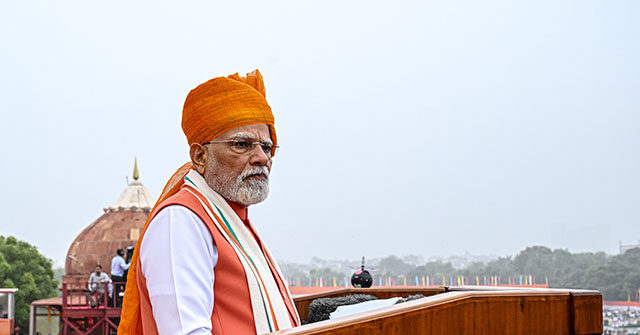Indian Prime Minister Narendra Modi on Friday repeated his vow to protect Indian farmers from competition with tariffs and trade barriers, even as President Donald Trump’s punishing retaliatory tariffs of up to 50 percent on Indian goods threaten to take effect.
Indian officials insisted, despite reports to the contrary, that the trade battle would have no bearing on major arms purchases from the United States.
Modi made his remarks on trade during an address to the nation on India’s Independence Day. India declared its independence from Britain on August 15, 1947. He spoke from the Red Fort in New Delhi, a historic symbol of imperial achievement from before the time of British colonialism.
“Farmers, fishermen, cattle rearers are our top priorities. Modi will stand like a wall against any policy that threatens their interests. India will never compromise when it comes to protecting the interests of our farmers,” the prime minister said, referring to himself in the third person.
Agricultural protectionism proved to be one of two major obstacles to India’s apparent enthusiasm for working out a trade deal with President Trump, the other being India’s insistence on buying huge volumes of discounted oil from Russia. Trump signaled at the beginning of August that India would pay a 25 percent general tariff. A week later, he added a 25 percent punitive tariff over India’s imports of Russian oil, which help to prop up the Russian economy and finance its invasion of Ukraine.
Modi’s comments on Friday were just the latest assurance from the prime minister and his top officials that he would never yield on protecting India’s agriculture industry, which employs over 80 million people. Indian officials argue that imports from America’s powerhouse agricultural industry would cost local jobs and profits by causing food prices to plummet. They also claim some prospective American imports would not meet Indian quality standards, including Hindu religious rules for products such as milk.
Modi attempted to pass a series of farm laws in 2020 to reform certain regulations concerning the growth and sale of produce. Indian farmers revolted on a massive scale, fearing the reforms would eliminate much-desired subsidies for crops like wheat and rice, and could pave the way for big agricultural companies to gobble up family farms.
Modi backed down and withdrew the farm laws in 2021, marking one of the few major defeats in his political career. The emboldened farmers have launched more protests when they felt their interests were threatened, including a huge march on New Delhi last year, when they accused Modi of reneging on some of the promises he made in 2021. To put it mildly, farmers are not a constituency Modi can ignore.
In his speech on Friday, Modi did not directly refer to Trump’s tariffs, but he promised to offer tax cuts to offset any hardships caused by the trade dispute, and he exhorted his citizens to develop more domestic production of items that India currently imports from the United States. Some of his supporters have gone further and called for outright boycotts of American products.
“The need of the hour is to take a resolve for building a strong India,” Modi said. “I want our traders, shopkeepers to display boards for ‘Swadeshi’ products.”
“Swadeshi” is a call to rely on domestic products instead of imports. It was a slogan during the anti-colonial movement of the early 20th Century, when Indians sought to reduce their reliance upon the British Empire.
Modi promised dramatic reductions in India’s Goods and Services Tax (GST) as a “Diwali gift.” Diwali is the “Festival of Lights,” a major Hindu holiday and prime Indian shopping season in October.
“This Diwali, I am going to make it a double Diwali for you,” Modi said, pledging “next-generation GST reforms” that would “substantially reduce the taxes on items for the common man.”
“Daily-use items will become cheaper, which will also strengthen our economy,” he promised.
The GST is a blanket tax that rolled India’s excise duties, value added tax, and other taxes into a single four-tier system beginning in 2017. There are currently four tiers or “slabs” to the GST, with a top rate of 28 percent. The reform plan under consideration would drop two of the tiers, leaving only five percent and 18 percent rates, with many of the household items currently taxed at 12 percent moving into the five percent bracket.
The Indian Foreign Ministry said on Thursday that it hoped for good relations with the United States despite the trade dispute, and said it was looking forward to a visit from a U.S. defense policy team later in August, to ensure arms purchases from America remain on track.
“This partnership has weathered several transitions and challenges … and we hope that the relationship will continue to move forward based on mutual respect and shared interests,” said Foreign Ministry spokesman Randhir Jaiswal.
Last week, Reuters reported that India was indefinitely “pausing” several major arms purchases from the United States, ostensibly to gain more leverage in trade negotiations. Although India was once almost entirely reliant upon Russian weapons, the United States has grown to become its third-largest arms supplier.
Reuters’ sources said the “pause” would affect India’s orders for Stryker combat vehicles, Javelin anti-tank missiles, and Boeing P-8I recon aircraft.
The Indian Defense Minister almost immediately rejected the Reuters report as “false and fabricated,” insisting that all three deals were proceeding “as per the extant procedures.”
Read the full article here


